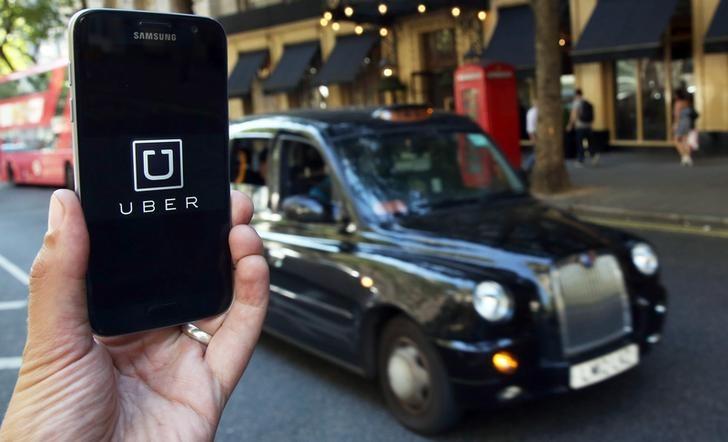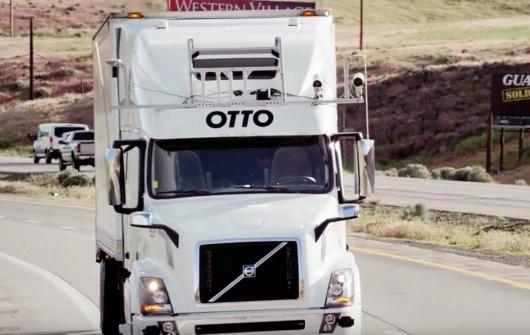“Keep on trucking”, a popular expression in the 1960s, means to carry on, to continue what one is doing, to keep plugging away. But if tired truck drivers ‘keep on trucking’ beyond their normal work hours, they put both themselves and other motorists at risk.
Ride-hailing giant Uber announced on Thursday a $680 million acquisition of Otto Motors, an Israeli startup specializing in converting normal trucks into autonomous ones. Self-driving trucks could spell an end to tired truckers on highways.
SEE ALSO: Ride-Sharing Startup Via Raises $100M; Revs Up Competition Against Uber, Lyft
Founded by former Google, Apple, and Tesla employees, including Israeli entrepreneur Lior Ron, Otto develops artificial intelligence, cameras, and sensors that are attached to the vehicle, giving the truck full driving capacity without the need for a driver. Otto trucks are currently undergoing trials in the San Francisco area.
A replacement for truckers?
Uber’s moves reflect its eagerness to advance self-driving technology. If its ambitions are realized, these vehicles could over time reduce its biggest cost, paying drivers. Uber would also be positioned to expand into the trucking industry, which had revenue of about $726.4 billion in the United States in 2015, according to trade data.
SEE ALSO: Public Transit App Moovit Launches Official Rio Olympics App, Integrates With Uber Taxis
Otto’s online blog cited the potential for the merger to transform the trucking industry. As one in three truckers get into a serious accident and 90% of truckers leave their jobs each year, this technology can “provide a path to sustainable commercial transportation.”
So far Otto has tested self-driving trucks for highway use only.
Developers hope for productivity gains with the new technology that will enable trucks to drive around the clock, leaving humans to rest, do paperwork and take controls only while going on and off highways.
Over the long-term, Uber and rivals such as Lyft could cut the cost of paying drivers if they can gradually incorporate self-driving cars into their fleets. But at least for now, said the source familiar with the Uber-Otto agreement, Uber will expand its driver network, which now stands at 1.5 million globally in more than 450 cities.
Pilot program in Pittsburgh
Sign up for our free weekly newsletter
SubscribeUber, which has a research center in Pittsburgh, will by the end of this month begin a pilot program in which trusted Uber customers will be able to use their phones to summon a self-driving car for use in a downtown Pittsburgh, according to a source with knowledge of Uber’s plans.
It will be the first time members of the public will be able to use self-driving vehicles. A driver trained to handle the autonomous cars will be behind the wheel to step in if needed.
$680 million: A truckload of cash
The purchase of Otto, a start-up company less than a year old with fewer than 100 employees, will be for 1 percent of Uber’s valuation, if certain technical targets are met, accourding to reports.
Recently, that valuation was about $68 billion, placing the value of the deal at about $680 million. Current Otto employees would get a fifth of profits Uber earns from a self-driving trucking business, if those targets are met.
Anthony Levandowski, one of Otto’s co-founders, will lead Uber’s self-driving efforts in San Francisco, Palo Alto and Pittsburgh. That includes personal transportation such as ride-hailing services, as well as delivery services and trucking. Levandowski was one of four founders of Otto, each of whom worked at Alphabet Inc’s Google and its self-driving program.
Eye on safety
A spokesman for U.S. safety regulator National Highway Traffic Safety Administration said in a statement that their office “continues to engage with all entities that are developing, testing and deploying automated technologies to ensure that they are advancing road safety.” He also added that, “federal guidelines will be issued soon on development and testing of “highly automated vehicles.”
We may have to wait a while till we see driverless trucks roaming our highways.
Until we do, ‘the truck stops here’.

Uber. Courtesy
Photos & Video: Otto, Uber
Related posts

Editors’ & Readers’ Choice: 10 Favorite NoCamels Articles

Forward Facing: What Does The Future Hold For Israeli High-Tech?

Impact Innovation: Israeli Startups That Could Shape Our Future




Facebook comments